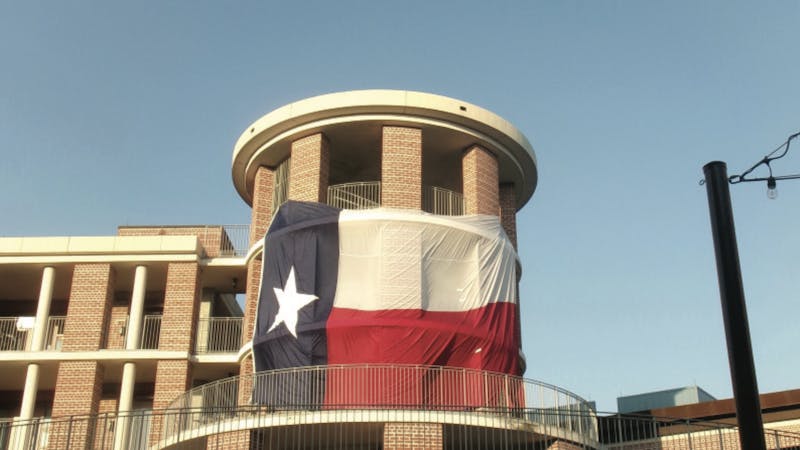Faculty and students continue adapting to endemic COVID-19

Genesis Hahn / Thresher
The first two weeks of classes have seen a rise in COVID-19 cases among the campus community. The number of positive cases is unknown as Rice stopped collecting data and phased out Crisis Management’s COVID resources.
Rice’s current COVID-19 guidelines mirror those of the CDC: People who test positive must isolate for five days and wear a mask in public for five days after that.
Wiess College senior Karm Ghei said he started to have symptoms of COVID-19 after participating in Orientation Week. While Ghei said his symptoms were mild, he said he chose to isolate for seven days to prevent infecting others with COVID-19. He wished Rice provided specific regulations rather than relying on personal responsibility as cases increase.
“It was a little frustrating because I saw [some] people take it more seriously than other people,” Ghei said.
Rice administration is allowing each instructor to decide what academic accommodations to provide to students who are missing class due to illness, according to Dean of Undergraduates Bridget Gorman. Jacqueline Couti, a professor of French and Francophone studies, has let students join class through Zoom or watch asynchronously since the first week of classes. She wants students to be able to participate and engage with their peers, she explained.
“I believe in flexibility and making students’ lives easier, because it’s hard … you’re sick, it’s the beginning of class, you don’t want to worry about anything else,” Couti said.
Moramay López-Alonso, an associate professor of history, said she gives asynchronous work to her students who are sick to keep up with the class.
“When I prepared the syllabus I was aware that another wave of COVID could very well happen at some point in the semester,” López-Alonso wrote in an email to the Thresher. “The fact that there have been COVID cases in my class has not affected the way my classroom runs and it should not affect [students’] performance.”
Ghei said all of his professors were understanding of his situation, but some were more accommodating than others.
“There wasn’t any professor that was not receptive,” Ghei said. “There was one professor that I didn’t have a Zoom for, and there wasn’t really an explanation for that … it didn’t affect my grade or anything, but I just didn’t have any class time for that class. But all the other classes … responded quickly and set up a Zoom for a lot of the people in the class who had COVID.”
Gorman said that the academic policy is meant to allow instructors to decide the manner in which they want to provide accommodations.
“As is the case for any class absence, including related to COVID or any illness, we do not mandate the manner in which instructors provide accommodations to students regarding missed classes and coursework that may be due,” Gorman wrote in an email to the Thresher. “We encourage instructors to be accommodating and work with students who must miss class due to COVID or any illness.”
Another professor said they held their face-to-face class exclusively on Zoom for the week of Aug. 28 to Sept. 1. to allow many of their students who tested positive for COVID but had few symptoms to continue learning.
The instructor made the decision to protect both their students’ and their own health, but they said it was difficult to do so as a non-tenure professor who did not want to violate any policy. They wished that Rice had acknowledged the increase in COVID cases and clarified delivery mode requirements. This professor spoke on the condition of anonymity because of fear of consequences to their job due to not having tenure.
Outside of classes, the operations of most campus establishments have continued. Rice Coffeehouse, however, closed temporarily to help reduce the spread of COVID.
Rice guidelines allow sick students to get food from the servery provided they wear a mask. Ghei said he tried to avoid the crowds during busy hours by either ordering food elsewhere or wearing a mask and staying away from others.
“People [in the servery] would try to say hi and I was like, ‘Oh, stay away from me’ … because I didn’t want to get other people infected,” Ghei said.
Ghei said it was helpful that his college coordinator provided COVID tests and masks for free, though they ran out quickly and not everyone he knew who wanted to could access them.
Duncan College magisters Winston Liaw and Eden King emailed health information to the college Aug. 24, nearly a week before the deans sent information to students, and followed up Aug. 31 with additional information. The magisters wrote in an email to the Thresher that they had to order more COVID tests through Rice after those in the college coordinator’s office ran out.
As the school year unfolds, Gorman said Rice’s approach to navigating post-pandemic COVID is to continue promoting healthy practices.
“COVID seems here to stay, and our posture reflects that reality,” Gorman wrote. “By treating it as endemic, we navigate it by encouraging COVID vaccination and adherence to best practices when you feel or are ill — test if exposed or symptomatic, isolate and rest if you test positive.”
More from The Rice Thresher
Rice lands high on Niche, Forbes college ranking lists
Rice recently ranked No. 10 on Niche’s Best Colleges in America list and No. 12 on Forbes’ annual America’s Top Colleges list in 2026. It was also recognized in several categories by the Princeton Review, placing in the top 10 in four categories.
From post-human novels to augmented reality, Rice hires new faculty
Rice welcomed 97 new professors this fall across disciplines, including a posthumanist Harvard scholar, a husband-wife duo and a computer science professor who graduated from Rice thrice.

First public of the year reckons with threats of a dry campus
After a Dis-O that saw four times as many calls for intoxication-related transports of students to the hospital compared to the prior three years, Cory Voskanian, a Martel College socials head tasked with planning the first public of the year, said that he was feeling the pressure.


Please note All comments are eligible for publication by The Rice Thresher.